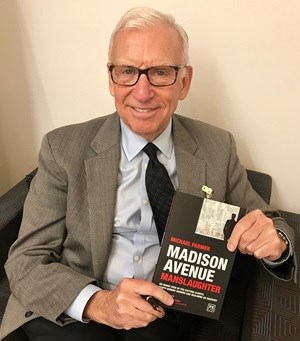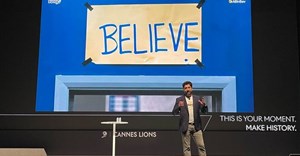#OneShow2017: Michael Farmer on fixing the problems in ad agencies
 Michael, it’s an absolute honour to be chatting to you…
Michael, it’s an absolute honour to be chatting to you…
I’m delighted to meet you!
For 20 years or more I was a straightforward management consultant, working on corporate strategy matters with the Boston Consulting Group and Bain & Co around the world. In 1990 I started my own firm, Farmer & Co in London, and one of my first clients was an ad agency that called me up and said, “We need a strategy consultant to solve our big problem.” I said, “Fine, I’d be happy to do it,” – it was Ogilvy & Mather London, and in 1992, they weren’t making any money. So I went in to do what I normally do, which is to get all the data. I didn’t know the industry – in fact, I never know the industry when I do a strategy piece – and there were three things I wanted to know for every client: how much work they did; what kind of work it was; what they were paid and how many people it took. I figured if I could get that data over time, over a couple of years in the past, I’d figure out what had changed that they went from making no money to making something. As it turned out, they didn’t have any information or records or data on how much work they did. They could describe in general, “We’re doing TV ads for Ford,” and that kind of thing, but how many, what type, how many people it takes, what’s the work – they didn’t have any documentation, so had to reconstruct. I had to find a way of gathering the work that they did and figure out through building a model how many people it should take, and 25 years later I’m still doing the same thing. Give me your perspective on the ad industry and your background in terms of writing this book, Madison Avenue Manslaughter.
Give me your perspective on the ad industry and your background in terms of writing this book, Madison Avenue Manslaughter. 
Because 25 years later, agencies – despite the fact that their fees have gone down every year and they’ve gone through globalisation, the rise of procurement and many other challenges – are still not keeping track of how much work they do. Because they don’t think they’re in the ad factory, they think they’re in the business of creating brands or creating emotion or coming up with big ideas. But the truth of the matter is, they’re making ads, and they make a lot of them.
I’ve got an agency I work with in Mexico that did 3,500 ads last year and 11,500 this year because of the rise of internet advertising. So, what I have found is that workloads have been growing – I’ve been keeping track of that for 25 years – fees have been going down, and agencies generally are owned by public holding companies that force them to generate a margin every year, so they downsize. So you’ve got an environment in which life is getting more complicated for their clients, brands aren’t growing, they’re doing more work, they’re doing it with less money, they’re doing it with more junior people and they’re not doing a very good job.
To me, coming out of a consulting background, I thought, “Hey, I’ve figured this out.” How tough can it be to recommend ‘what you need to do is keep track of the work that you’re doing, have a methodology for calculating the number of people it takes, and use that in fee negotiations to halt the erosion of price’?
 But isn’t that what agencies are currently doing, when they go into procurement to negotiate their fees?
But isn’t that what agencies are currently doing, when they go into procurement to negotiate their fees?
Absolutely not. First of all, most fees are given to them by a client that’s already budgeted how much they’re going to spend on production and on agency, so they’ve already figured it out. Let’s say for a calendar-year basis, a client’s figured out what they’re going to spend in October. They tell the agency “We spent $2m with you last year, it’s going to be $1.5m this year as we’re having tough times.” The agency says, “Oh that’s so unfair but OK.” In the meantime, there has not been a jointly negotiated scope of work; there has not been a programme of work put together for the purpose of solving the brand problem.
In fact, either the scope dribbles out of the client quarter by quarter, or it’s severely changed. But agencies as a rule normally do not participate in that. Even if they did, the documentation of scope is so poor that it’s extremely hard for anybody to figure out what’s in it. So there is a major gap in process that agencies go through just to figure out how much work they’re going to do with you this year, for what purpose and what’s a fair fee. They don’t go through that at all.
After 25 years, I’ve observed that agency executives have not grappled with this problem and have not fixed it. Instead, they blame the client for the situation they’re in.
 So what would your advice be, to these agency executives?
So what would your advice be, to these agency executives?
Number one – do the simple thing. Have a policy of ‘every client that we work on will document its scope of work within the agency, in a uniform format, and we will use that to renegotiate our fees and we will use that to review the performance of our client heads to carry out that set of responsibilities’.
 Do you think the clients are going to be receptive to this?
Do you think the clients are going to be receptive to this?
I think the clients have got a problem with their brands. So if an agency said, “Look, we’re in this with you to fix your brand performance problem, here’s our recommended media plan and scope of work that has the highest probability of getting to that goal,” I think the clients would be overjoyed.
 It seems really weird that this is not happening.
It seems really weird that this is not happening.
That’s why I wrote the book. I thought after 20 to 25 years of doing this work and seeing nothing happening, “this is really weird”. I thought it was me. I thought, “I’m working on a one-on-one basis with my clients and I need a broader platform.” So I figured I’d write a book about what is going on in the industry: Why the fees keep on going down, why the work keeps on going up, why no one is doing anything to relieve the workload and all the other things that they could do to fix the problem. I figured it would give a broader platform for defining the problem that agencies actually have.
 Is it working yet?
Is it working yet?
Nope! Which is why I’m now writing a weekly article for Media Village and doing a number of other things to try to raise the level of awareness and create a dialogue, so that agency executives in effect will be shamed if they aren’t doing something about it.
Visit our One Show special section for the latest updates!









